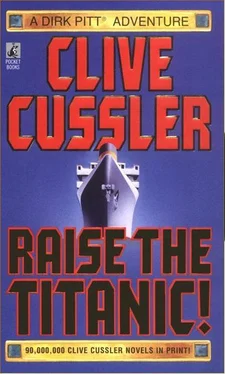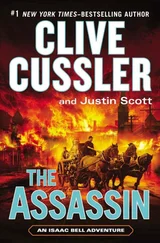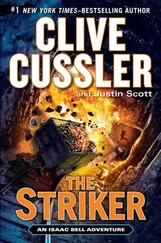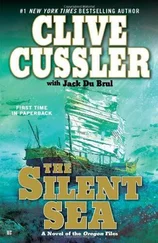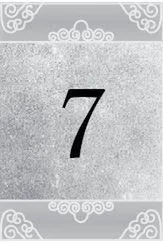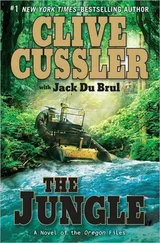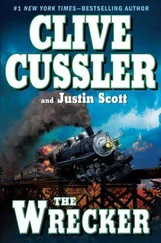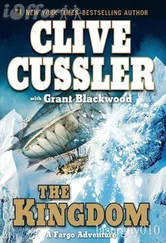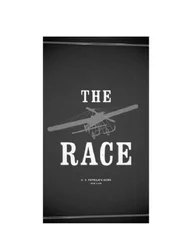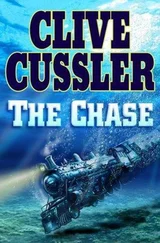"A bit of an exaggeration," Young said, "but I'm flattered, nonetheless."
The drinks arrived and they sipped them for a minute. Donner took the time to study the pictures of turn-of-the-century Colorado silver kings that hung on the walls. Their faces all projected the same intense stare, as if they were trying to melt the camera lens with their wealth-fortified arrogance.
"Tell me, Mr. Donner, how can anyone file a pension claim on a seventy-six-year-old accident?"
"It seems the widow didn't receive all she was entitled to," Donner said, skating onto unsure ice. "Her daughter is demanding the back pay, so to speak."
"I see," Young said. He stared across the table speculatively and then began idly tapping his spoon against a plate. "Which of the men who were lost in the Little Angel disaster are you interested in?"
"My compliments," Donner said, avoiding the stare and unfolding his napkin self-consciously. "You don't miss a trick."
"It's nothing, really. A seventy-six-year-old mining accident. Nine men missing. It could only be the Little Angel disaster."
"The man's name was Brewster."
Young stared at him an extra moment, then stopped the plate-tapping and banged his spoon against the table top. "Joshua Hays Brewster," he murmured the name. "Born to William Buck Brewster and Hettie Masters in Sidney, Nebraska, on April 4 . . . or was it April 5, 1878."
Donner's eyes opened wide. "How could you possibly know all that?"
"Oh, I know that and much more." Young smiled. "Mining engineers, or the Lace-Boot Brigade, as they were once known, are a rather cliquish group. It's one of the few professions where sons follow fathers and also marry sisters or daughters of other mining engineers."
"Are you about to say that you were related to Joshua Hays Brewster?"
"My uncle." Young grinned.
The ice parted and Donner fell through.
"You look like you could stand another drink, Mr. Donner." Young signaled to the waitress for another round. "Needless to say, there is no daughter who is seeking a claim to a pension; my mother's brother died a childless bachelor."
"Liars never prosper," Donner said with a thin smile. "I'm sorry if I've embarrassed you by foolishly painting myself into a corner."
"Can you enlighten me?"
"I would prefer not to."
"You are from the government?" Young asked.
Donner showed him his credentials.
"Then, may I ask why you're investigating my long-dead uncle?"
"I would prefer not to," Donner repeated. "Not at this time, at any rate."
"What do you wish to know?"
"Whatever you can tell me about Joshua Hays Brewster and the Little Angel accident."
The drinks came along with the salad. Donner agreed that the dressing was excellent. They ate in silence. When Young had finished and wiped his tiny white mustache, he took a deep breath and relaxed against the backrest of the booth.
"My uncle was typical of the men who developed the mines in the early nineteen hundreds; white, eager, and middle class, and except for his small size-he stood only five feet two-he could easily have passed for what the novelists of the day vividly depicted as a gentlemanly, two-fisted, devil-may-care, adventurous mining engineer, complete with shining boots, jodhpurs, and a Smokey-the-Bear ranger hat."
"You make him sound like a hero from an old Saturday matinee serial."
"A fictional hero could never have measured up," Young said. "The field is highly specialized today, of course, but an engineer of the old school had to be as tough as the rock he mined, and he had to be versatile-mechanic, electrician, surveyor, metallurgist, geologist, lawyer, arbitrator between penny-pinching management and muscle-brained workers. This was the kind of man it took to run a mine. This was Joshua Hays Brewster."
Donner kept silent, slowly swirling the liquor around in his glass.
"After my uncle graduated from the School of Mines," Young continued, "he followed his profession in the Klondike, Australia, and Russia before returning to the Rockies in 1908 to manage the Sour Rock and Buffalo, a pair of mines at Leadville owned by a group of French financiers in Paris who never laid eyes on Colorado."
"The French owned mining claims in the States?"
"Yes. Their capital flowed heavily throughout the West. Gold and silver, cattle, sheep, real estate; you name it, they had a finger in it."
"What possessed Brewster to reopen the Little Angel?"
"That's a strange story in itself," Young said. "The mine was worthless. The Alabama Burrow, three hundred yards away, coughed up two million dollars in silver before the water in the lower levels began running ahead of the pumps. That was the shaft that hit the high-grade lode. The Little Angel never came close." Young paused to sip at his drink and then stared at it as though he were seeing a vague image in the ice cubes. "When my uncle advertised his intentions to reopen the mine to anyone who would listen, people who knew him well were shocked. Yes, Mr. Donner, shocked. Joshua Hays Brewster was a cautious man, a man of painstaking detail. His every move was carefully calculated in terms of success. He never played the odds unless they were steeply in his favor. For him to publicly announce such a hare-brained scheme was unthinkable. The mere act was considered by all to be that of a madman."
"Maybe he found some clue the others had missed."
Young shook his head. "I've been a geologist for over sixty years, Mr. Donner, and a damned good one. I've re-entered and examined the Little Angel down to the flooded levels, and analyzed every accessible inch of the Alabama Burrow, and I'm telling you positively and unequivocally there is no untapped vein of silver down there now, nor was there one in 1911."
The Monte Cristo sandwiches came and the salad plates were whisked away.
"Are you suggesting your uncle went insane?"
"The possibility has occurred to me. Brain tumors were generally undiagnosed in those days."
"So were nervous breakdowns."
Young wolfed the first quarter of his sandwich and drained his second martini. "How is your Monte Cristo, Mr. Donner?"
Donner forced a few bites. "Excellent, and yours?"
"Grandly delicious. Would you like my private theory? Don't bother to be polite; you can laugh without embarrassment. Everyone else does when they hear it."
"I promise you I won't laugh," Donner said, his tone dead serious.
"Be sure to dip your Monte Cristo in the grape jam, Mr. Donner. It heightens the pleasure. Now then, as I've mentioned, my uncle was a man of great detail, a keen observer of his work, his surroundings and accomplishments. I've collected most of his diaries and notebooks; they fill a goodly portion of my study's bookshelves. His remarks concerning the Sour Rock and the Buffalo mines, for example, take up five hundred and twenty-seven pages of exacting sketches and neatly legible handwriting. The pages in the notebook that come under the heading of the 'Little Angel Mine', however, are totally blank."
"He left nothing behind regarding the Little Angel, not even a letter, perhaps?"
Young shrugged and shook his head. "It was as though there was nothing to record. It was as though Joshua Hays Brewster and his eight-man crew went down into the bowels of the earth never intending to return."
"What are you suggesting?"
"Ridiculous as it seems," Young admitted, "the thought of mass suicide once darted through my mind. Extensive research showed me that all nine men were either bachelors or widowers. Most were itinerant loners who drifted from digging to digging, looking for any excuse to move on when they became bored or disenchanted with the foreman or mine management. They had little to live for once they became too old to work the mines."
"But Jason Hobart had a wife," Donner said.
Читать дальше
